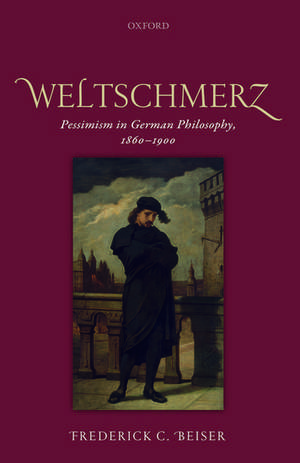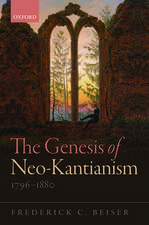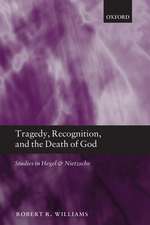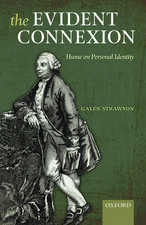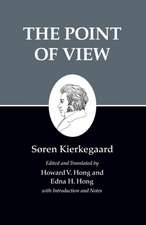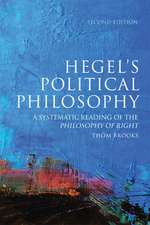Weltschmerz: Pessimism in German Philosophy, 1860-1900
Autor Frederick C. Beiseren Limba Engleză Hardback – 5 mai 2016
| Toate formatele și edițiile | Preț | Express |
|---|---|---|
| Paperback (1) | 255.74 lei 3-5 săpt. | +20.91 lei 6-10 zile |
| OUP OXFORD – 27 sep 2018 | 255.74 lei 3-5 săpt. | +20.91 lei 6-10 zile |
| Hardback (1) | 518.04 lei 31-37 zile | |
| OUP OXFORD – 5 mai 2016 | 518.04 lei 31-37 zile |
Preț: 518.04 lei
Preț vechi: 613.56 lei
-16% Nou
Puncte Express: 777
Preț estimativ în valută:
99.13€ • 102.27$ • 82.72£
99.13€ • 102.27$ • 82.72£
Carte tipărită la comandă
Livrare economică 15-21 martie
Preluare comenzi: 021 569.72.76
Specificații
ISBN-13: 9780198768715
ISBN-10: 0198768710
Pagini: 320
Dimensiuni: 168 x 242 x 24 mm
Greutate: 0.59 kg
Editura: OUP OXFORD
Colecția OUP Oxford
Locul publicării:Oxford, United Kingdom
ISBN-10: 0198768710
Pagini: 320
Dimensiuni: 168 x 242 x 24 mm
Greutate: 0.59 kg
Editura: OUP OXFORD
Colecția OUP Oxford
Locul publicării:Oxford, United Kingdom
Recenzii
Beisers book is delightful, clear and thorough. It is written in the best style of historians of philosophy.
Beiser has made an important contribution to our understanding of nineteenth-century German philosophy that should be required reading of anyone who seeks to understand the full story of the German philosophical tradition in this century. It paints a detailed, rich, fascinating picture of a hitherto forgotten controversy, and one that deals with issues of value and meaning in life that touch us all.
Overall, this is another excellent book by Beiser, unearthing another major, overlooked controversy in the history of philosophy, with a cast of insightful philosophers making arguments that deserve continued attention. Throughout, Beiser balances accessibility to non-specialists and substantive engagement with important secondary literature on Schopenhauer. He not only explains the views of the participants in this great philosophical drama, but inserts himselfand his readersinto that drama. He describes systems, arguments, and objections so richly that I often found myself interjecting my own thoughts about how one or another philosopher might respond to various objections.
Beiser has made an important contribution to our understanding of nineteenth-century German philosophy that should be required reading of anyone who seeks to understand the full story of the German philosophical tradition in this century. It paints a detailed, rich, fascinating picture of a hitherto forgotten controversy, and one that deals with issues of value and meaning in life that touch us all.
Overall, this is another excellent book by Beiser, unearthing another major, overlooked controversy in the history of philosophy, with a cast of insightful philosophers making arguments that deserve continued attention. Throughout, Beiser balances accessibility to non-specialists and substantive engagement with important secondary literature on Schopenhauer. He not only explains the views of the participants in this great philosophical drama, but inserts himselfand his readersinto that drama. He describes systems, arguments, and objections so richly that I often found myself interjecting my own thoughts about how one or another philosopher might respond to various objections.
Notă biografică
Frederick C. Beiser was born and raised in the US, and studied in the UK at Oriel and Wolfson Colleges, Oxford. He also studied in Germany and lived in Berlin for many years, receiving stipends from the Fritz Thyssen Stiftung and the Humboldt Stiftung. He has taught in universities across the US, and is currently Professor of Philosophy at Syracuse University, Syracuse, New York. Beiser is the author of Schiller as Philosopher (OUP, 2005), Diotima's Children (OUP, 2009), The German Historicist Tradition (OUP, 2011), Late German Idealism (OUP, 2013), and The Genesis of Neo-Kantianism, 1796-1880 (OUP, 2014).
